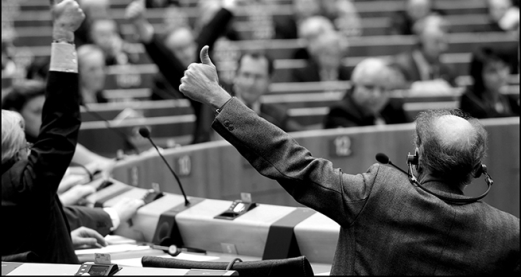
Currency
 The impact on the financial sector – credited with generating 8% of the UK’s national output, most of its service exports and over £20bn of annual tax revenue – will be a key consideration in the referendum vote. Various financial institutions with large interests in Britain have warned that they and their customers might suffer from a Brexit, including Barclays and the world’s biggest fund manager BlackRock. But a report by Boris Johnson’s economic adviser Gerard Lyons suggests that the City of London – and the country – can now be stronger outside the EU, a verdict which helped to put the London Mayor on the opposite side to the Prime Minister in the referendum, debate.
The impact on the financial sector – credited with generating 8% of the UK’s national output, most of its service exports and over £20bn of annual tax revenue – will be a key consideration in the referendum vote. Various financial institutions with large interests in Britain have warned that they and their customers might suffer from a Brexit, including Barclays and the world’s biggest fund manager BlackRock. But a report by Boris Johnson’s economic adviser Gerard Lyons suggests that the City of London – and the country – can now be stronger outside the EU, a verdict which helped to put the London Mayor on the opposite side to the Prime Minister in the referendum, debate.
Reasons to Remain
Financial markets dislike uncertainty, and the unclear consequences of a UK exit – compared to the reasonably clear picture of life inside – is one reason for financial institutions preferring things the way they are. There are particular concerns about a slide in the value of the Pound, which has already taken some early dives after some senior Cabinet members came down on the Leave side. The Business Secretary, Sajid Javid, has said he will vote to Remain to avoid short-term uncertainty for the economy, despite his ultimate sympathy for the Leave campaign.
Longer-term concerns arise from the possibility of a Brexit restricting access to foreign markets, without could mean substantial downsizing for a UK financial sector that makes much of its profit from managing other countries’ money. Curbing immigration from other EU countries seems to be a main motive for those planning a Leave vote, or campaigning for one. Investors tend to be sceptical over the chances of financial institutions, and the businesses they serve, still enjoying free movement of goods, services and capital around the EU if the UK restricts the free movement of labour.
Incentives to Leave
But Leave campaigners identify ways in which the longer-run benefits of Brexit could outweigh the costs, and will call on voters to avoid clinging to the status quo because of a ‘short-termist’ worry about transition costs. For the financial sector, unusually big in the UK because it generates so much business abroad, the fastest-expanding markets for banking, insurance, fund management and securities trade now seem to lie outside Europe – in the emerging markets of Asia, Latin America and Africa, and in a US economy which most forecasters say is now on a substantially faster growth path than the EU.
While criticising their opponents’ ‘scare tactics’, the Leave side also argues that the risks of abandoning EU membership have now become lower than the risks of staying in. They worry, in particular, that staying in the EU would expose the UK to its troubled experiment with the Euro Area. In its present form, the 17-member Eurozone may be destined to underperform the UK and US economies because of the limits it imposes on freedom of budgetary action, and the problems it causes for less dynamic members. To overcome these constraints, the Eurozone must pursue plans for deeper integration including a banking union which could impede the UK’s unusually large banking sector - despite the ‘special status’ deal secured by David Cameron in February which exempts non-euro-countries’ banks from any new rules set by the Zone. And if the Eurozone breaks up, there could be more years of disruption and downturn in the European economy, from which the UK might be better shielded if it lessened its trade links and stepped up engagement with economies outside the EU.
The referee stays neutral
The Bank of England has ultimate responsibility for keeping the UK financial system stable, maintaining a 2% inflation target and ensuring the health of financial firms under the Prudential Regulation Agency. But it’s also too old and wise an institution to take political sides in the Brexit debate. The assessment it published last October states clearly that EU membership has made the UK economy more open to trade, which helps it become more competitive and innovative. But it also points out that greater openness means more exposure to financial market contagion, especially from the Eurozone, and that the task of maintaining a dynamic, well-regulated UK financial sector may “become more challenging as the euro area integrates further.” So while its report emphasises the extent to which UK financial services currently build on their EU connections, it offers fuel for both sides of the argument, enabling opponents of the Eurozone to argue that Britain would be better-off out whether the Eurozone now prosperously pulls together or disastrously falls apart.
Global Trade
 Has the EU lost relevance as an economic bloc, with Europe shrinking in the world as a result of emerging-market growth and globalization? Or do China’s rising economic power, and instabilities in a more integrated world economy, make it ever more vital for EU countries to stay together?
Has the EU lost relevance as an economic bloc, with Europe shrinking in the world as a result of emerging-market growth and globalization? Or do China’s rising economic power, and instabilities in a more integrated world economy, make it ever more vital for EU countries to stay together?
“Stay” campaigners say that EU membership gives the UK access to more advantageous and comprehensive free-trade arrangements, and stronger safeguards against abuses. The EU can use its status as the world’s largest integrated economy to get better trade terms from other countries, and has the strength to resist when trading partners misbehave (by unfairly keeping out our exports, or ‘dumping’ underpriced imports on us). They point to the US trade representative’s warning in October 2015 that the UK would face extra trade barriers in America if its left the EU, and China’s preference for the UK to stay in the EU in a bridging role. The EU can claim to have advanced free trade on a regional basis while the World Trade Organizations’ efforts at a global trade pact ran into the ground. Its market size attracts foreign direct investment (FDI) into Europe and particularly the UK, whose economy would have been held back without this inflow.
“Leave” campaigners say the UK would actually find it easier to negotiate free trade deals with other countries if it were outside the EU, which must design them to satisfy 27 other member states and generally travels at the speed of the slowest. They argue that the UK already has most of the trade deals it needs – which few would want to renegotiate or reverse if it left the EU – and could get better terms on new ones, because the EU’s huge size makes other countries take a tougher stance against it. Some argue that the EU, by setting a common customs tariff (while scrapping internal tariffs) and still subsidising its agriculture, distorts a world trade system that would work better with individual countries. Others say the EU is being too weak when it comes to the Transatlantic Trade and Investment Partnership (TTIP), which critics attack for potentially forcing the privatisation of public goods and services which member governments want to keep public, and for the secrecy surrounding its negotiation. It has been largely powerless to defend a steel industry hit by cheap imports, with its rules actually preventing member states assisting steelmakers threatened with closure.
If it left the EU, one of the UK’s first tasks would be to negotiate a new trade deal with the remaining 27-member bloc. The “Stay” campaigners draw stern lessons from Canada’s ongoing problems in concluding a bilateral trade treaty with the EU that was supposed to be ready in 2014. To the “Leave” campaign, Eurocrats’ frank expressions of how much they need the UK clearly signal that they will still want all its trade, even if they can’t retain its membership.
Two-Speed Union
 The term of a two-speed European Union relates to the fact that Member States can implement EU law at various speeds, which consequently leads to a differing status of certain EU law in every Member State.
The term of a two-speed European Union relates to the fact that Member States can implement EU law at various speeds, which consequently leads to a differing status of certain EU law in every Member State.
This aspect is particularly of interest for the UK, when one of the aspects of the negotiation process relates to the exemption of the aim to create an ever closer union. In the Treaty of Rome, signed in 1957 and forming the basis for the European Union to date, the Heads of government expressed their determination
“to lay the foundations of an ever closer union among the peoples of Europe”.
For the government, it was essential to ensure a protection of UK sovereignty in some form and to be guaranteed an exemption from the very political goal of an ever closer union seemed a valuable and simple option.
This amendment to the Treaty does, however, need to be agreed by other European Union institutions before it is guaranteed. Once agreed and ratified, it will then mean, that any agreements relating to political integration amongst the Member State will remain without impact on the UK. The actual meaning of an ever closer union in law is not defined anywhere and it will remain to be seen how often the UK will have to make use of their guaranteed exception.
Parliament Veto
 The parliament veto was one of the aspects that made the government’s wish list for a renegotiated relationship between the EU and the UK. The envisaged veto related to the impact the UK’s parliament would have on European Union decisions relating to the monetary Union, meaning those Member States having the Euro as their currency. The government’s incentive was that Euro Member States should not be able to pass legislating mainly benefiting those in the Eurozone and potentially disadvantaging those outside the Eurozone. This demand has not survived the negotiation process, but is likely to be used by the out-campaign as an example for the weakness of the newly found agreements. What this criticism is likely to overlook is that the EU can only ever legislate in those areas that it has the competence to do so.
The parliament veto was one of the aspects that made the government’s wish list for a renegotiated relationship between the EU and the UK. The envisaged veto related to the impact the UK’s parliament would have on European Union decisions relating to the monetary Union, meaning those Member States having the Euro as their currency. The government’s incentive was that Euro Member States should not be able to pass legislating mainly benefiting those in the Eurozone and potentially disadvantaging those outside the Eurozone. This demand has not survived the negotiation process, but is likely to be used by the out-campaign as an example for the weakness of the newly found agreements. What this criticism is likely to overlook is that the EU can only ever legislate in those areas that it has the competence to do so.
Explore more about the EU referendum...
Study at The OU...
This article is part of an EU Referendum Hub. To find out more from the official 'leave' campaign visit 'Vote Leave' and to find out more from the official 'stay' campaign visit 'Britain Stronger In Europe'.
Please note: The opinions expressed in this hub are those of the individual authors, and do not represent the views of The Open University.


Rate and Review
Rate this article
Review this article
Log into OpenLearn to leave reviews and join in the conversation.
Article reviews
I'm sure N.A.T.O. had a part to play in our peace Andrew. But wait there they did receive a peace prize :)
John Skillen - 14 June 2016 6:22pm
It's mainly sovereignty for me. We can cooperated without pooling or as i would say, watering down our democracy. People didn't vote for what we have now so what can we expect in the future. An U.S of Europe ? A European defence force ? Love Europe and fellow Europeans i can't stand what the EU has become. I'm out, #voteleave
John Skillen - 14 June 2016 6:35pm
I've been going mad on twitter sorry about the hashtag haha woops.
Is it only me? The link to the EU Referendum 'Sovereignty' section took me to the 'Economics' section.... which seems correctly linked to its button!!!!!!!!!!!!! What happened to 'Sovereignty, voting and vetos' please?
Karen Mitchell - 26 May 2016 12:54pm
Sorry, found it at the bottom of the page!